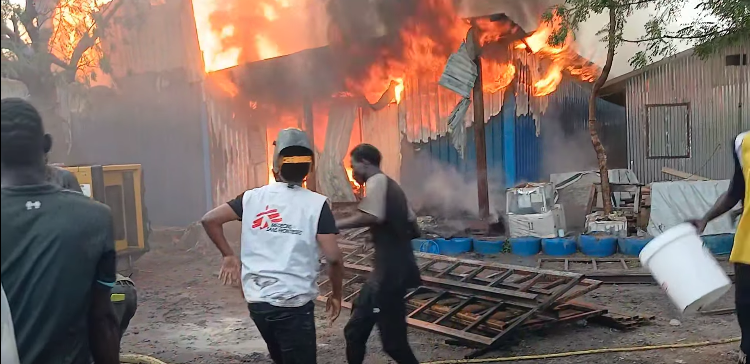David Charo Kahindi, MSF’s Medical Coordinator in South Sudan, was in Old Fangak the day the hospital was bombed. He was part of the team that extinguished the fire and treated and evacuated the wounded patients. Here, he describes what happened.
“I had no words to explain to the patients that the hospital was no longer safe for them.”
I was awakened by the bombing at around 04:50 on Saturday morning. I could hear helicopters flying overhead and people screaming all around us. Every time I heard the helicopters, I feared for my life, the lives of the population, the patients, and the staff. The bombing continued for about an hour. All I could hear were gunshots and the screams of the people.
When it finally went quiet, I immediately took a boat to the hospital. I met our watchman at the gate, which was completely shattered. Bullets were everywhere. As I walked into the compound, I saw pieces of exploded weaponry.
When I reached the pharmacy, it was on fire. Everyone—the team and the community—was trying to fetch water with buckets to put it out. It was no easy task because our fuel tanks were just a few meters away from the pharmacy. We feared that if the fire continued, the fuel would explode and cause another disaster on top of the one we were already facing.
At first, I thought we might save some of the medications inside, but it quickly became clear that whoever bombed the hospital wanted the pharmacy and all its medications completely destroyed. It took us about five hours to fully extinguish the fire.
Next, I entered the hospital. First, I went to the men’s ward, where two patients had been the night before. When I entered, no one was there, but there were bullet holes in the ground and blood on the floor. I was worried. I didn’t know what had happened or where the patients had gone. The same was true in the women’s ward.
Then, I reached the emergency room, where the team was busy stabilizing and treating patients who had just arrived from the town. There were 20 in total, some in very critical condition. We urgently needed to stop the bleeding—some had been shot in the head, chest, or abdomen. We did everything we could, but we had no supplies other than what had been on the ward before the attack. What we had was far from enough.
After stabilizing the patients, we evacuated them by speedboat to a village about an hour away, which we considered safer. Most of the patients were women, and there were also wounded children as young as 15. In the village, there was nothing but a tent. We were in the middle of nowhere. We kept the patients there and gave them the limited medication we had brought. The next day, they were airlifted to a hospital in Akobo for further treatment.
However, around 10,000 people had fled to the same location, and by morning, it was clear we didn’t have enough supplies to run a health facility capable of serving so many. We urgently called for help from the team in Juba, and with the support of the United Nations, we airlifted 350kg of medical supplies to set up a health post in the tent. We hope no more wounded arrive, but we continue to hear reports of ongoing bombings in other areas.
I am heartbroken by what has happened. The hospital had served the area for over 10 years and was a lifeline for more than 100,000 people. Hospitals should never be targets, and I utterly condemn this bombing. It was a 35-bed facility with outpatient and inpatient wards, maternity services, and the ability to refer severe cases to higher-level facilities. Now, there is nothing left.




